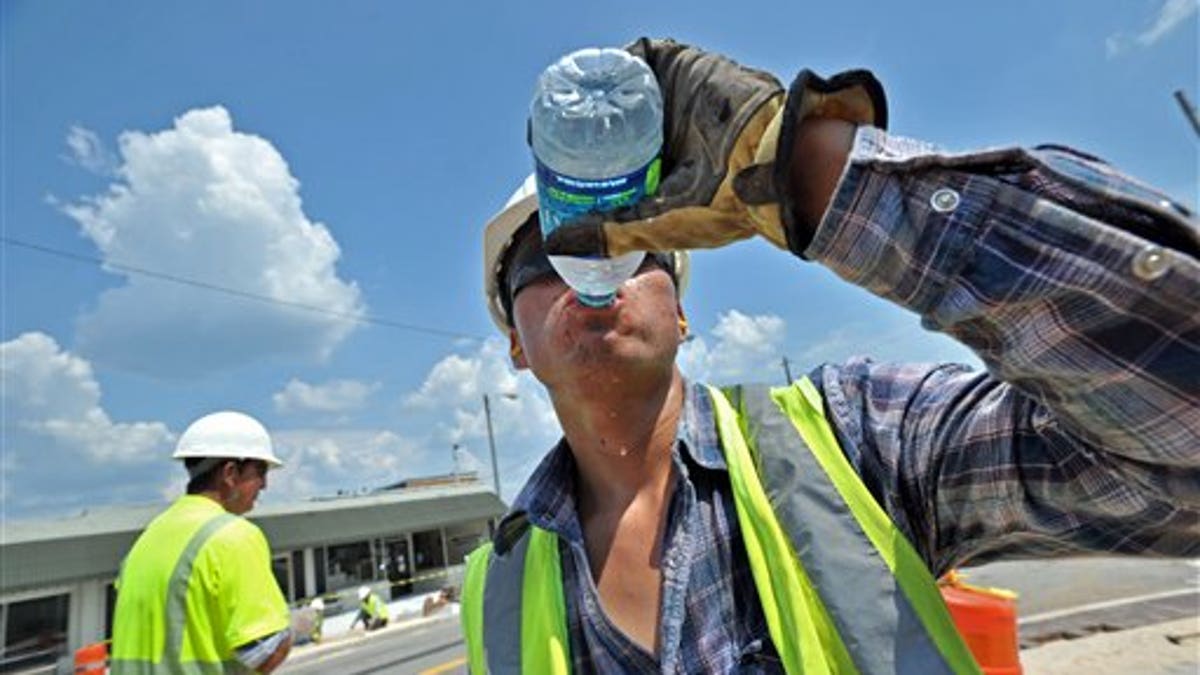
July 13: Jose Robles, foreground, crew with SD & C Inc., drinks some water as he and his colleague Jabier Garcia, left, work on decoration on Main Street in downtown Tucker, Ga. (AP/Atlanta Journal-Constitution)
OKLAHOMA CITY – As temperatures climbed into the 90s Sunday in Steele, N.D., a small window air conditioner in Paul and Betty Smokov's ranch home just couldn't keep up.
"It's 82 in the house," Betty Smokov said. "The heat is really oppressive and sticky."
That observation could be made anywhere in the central U.S. Heat advisories and warnings were in place in 17 states, from Texas to Michigan, as temperatures and humidity combined to make being outside uncomfortable for millions. One National Weather Service forecaster called the heat wave "unrelenting" and said sweaty residents shouldn't expect any relief soon: A so-called "heat dome" over the region isn't moving much.
"The trend is not our friend right now," said Daryl Williams, a forecaster in Norman.
In Oklahoma City, forecasters expected another day of 100-degree heat Sunday, which would be the 27th day this year the city has reached 100 or above. The city is on pace to break its record for such days -- 50 set in 1980 -- with triple-digit heat possible through September.
It's even worse in western Oklahoma, where temperatures at 110 or above have been common in recent weeks. In Enid, asphalt at a major intersection along U.S. Highway 412 buckled Saturday night from the intense heat.
Justin Tinder of Weatherford and his family visited the Oklahoma City Zoo on Sunday, arriving at 9 a.m.
"By noon, we were headed out," Tinder said. "It was too hot for us to stand much longer. We decided to check it in and go find some air conditioning."
In Chicago, city officials said a half-dozen cooling centers would remain open this week, as temperatures as high as 105 were forecast in Illinois.
Cooling centers also were open in Detroit to help residents who don't have air conditioning at home. Others were heading toward water for relief, including 65-year-old welder Marcellus Washington, who wore a floppy cloth fishing hat and sunglasses as he walked through a park on the Detroit River that marks the border with Canada.
"A day like this, you can't beat it," Washington said. "It's a heavenly day. It's God's weather."
Others who had to be outside in the heat took precautions. North Dakota National Guard Capt. Dan Murphy said several hundred soldiers deployed for flood-fighting efforts in the Dakotas were required to take mandatory rest breaks in the shade.
"It's hot in those vests and uniforms," Murphy said. "These are soldiers. They can't just strip down to T-shirts and shorts."
Officials at the Cornhusker State Games, an amateur sports festival in Nebraska, had crews bring extra water and ice for participants.
"It takes a physical toll on anyone out there," said the event's executive director, Dave Minarik.
Dwight Anderson, the owner of an Omaha, Neb., amusement park, had two tons of ice cubes dumped in the park's swimming pools Friday night to lower the water temperature from 88 degrees to 82. Anderson said he plans to dump more ice into the Fun Plex pools on Monday night or Tuesday morning.
The Schwan's USA Cup youth soccer tournament in Blaine, Minn., suspended play for a time Sunday because of heat indexes that soared to 110 degrees. Tournament spokesman Barclay Kruse said organizers wanted to avoid any heat-related health issues before they developed.
Police said heat may have played a role in the death of a 55-year-old man at a homeless camp in Springfield, Mo., on Saturday. Police found him in a small tent after others at the camp raised alarm. An autopsy is scheduled for Monday.
The heat also is adversely affecting wildlife. The Texas AgriLife Extension Service said last week that pregnant does are having difficulty carrying fawns to term and other fawns are being born prematurely.
Texas A&M University researchers determined the period from February to June was the driest such period on record in Texas, with a statewide average of 4.26 inches of rain. The next driest February-to-June stretch was in 1917, with a 6.45-inch rain average.
The Smokovs in North Dakota monitored their cattle for heat symptoms Sunday as temperatures neared triple digits.
"The cattle seem to be OK and we haven't lost any from the heat," Betty Smokov said. "We're making sure they got water and in this heat, that's all you can do."

